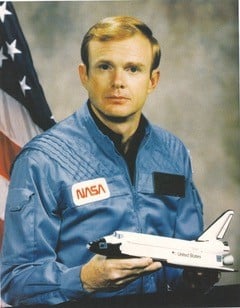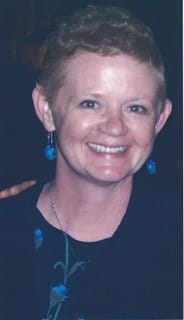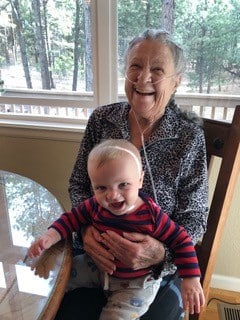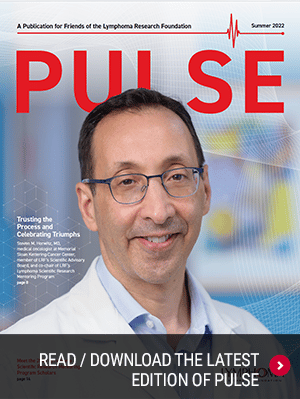
Latest News

Roy Bridges has the type of life story you need to read to believe. Starting on a farm in rural northeast Georgia, it includes attending the U.S. Air Force Academy; surviving 226 Vietnam combat missions; serving as a staff officer in The Pentagon; building a family with his wife, Benita; and going all the way to space and back, as Roy was one of the select few pilots of the Space Shuttle Challenger for NASA in the 1980s.
But even astronauts must come back to Earth, and in Roy’s case, that return included his daughter Tanya’s lymphoma diagnosis in 2002.
“At the time, I was serving as center director for the Kennedy Space Center, and my wife and I got a call from our daughter Tanya one evening in October,” Roy explained. “She said, ‘Hey, I’m on my way to UCLA Medical Center. I’ve been diagnosed with stage four non-Hodgkin lymphoma (NHL), and I am on my way to start treatment.’”
The news came as a shock to Roy and Benita. Tanya was just 32 at the time, and she and her husband had two young children.
“We kind of had an idyllic life, living on the beach in Florida, near the space center, and then suddenly this happened, which was an ‘Oh my God’ moment. Your mind goes to the worst possible place,” Roy explained. “At the time, I just heard ‘cancer,’ and that’s never a good thing, but I didn’t know anything about NHL. We dropped what we were doing to provide support to Tanya and her family, who were living in between San Bernardino and Barstow at the time, in the Mojave Desert.”
Tanya’s initial treatment regimen consisted of chemotherapy and radiation. After experiencing a brief remission, it came back in May 2004. She received her first bone marrow transplant of her own bone marrow cells, which seemed to be working. However, unfortunately, it returned in the fall of 2004, more aggressive than before. Tanya received a second bone marrow transplant from an anonymous donor in March 2005, and again, seemed to be getting better, but in July 2005, she called her parents to tell them that she was headed back to the hospital.
Initially, Tanya seemed to be doing better in the hospital, but sadly, she was moved to the ICU, and despite efforts to save her, passed away in July 2005.
“The last time I spoke to Tanya was the same day she coded and was sent to ICU—I was supposed to be going out there that day but was running behind on some stuff I needed to get done,” Roy explained. “Tanya said, ‘Well, Dad, I’m feeling fine. I want you to stay and get your work done.’ A few hours later, my wife tells me she’s coded and is in intensive care, so I scrambled to rebook my flight to get to her. Unfortunately, Tanya never regained consciousness.”

The Realities of Being a Caregiver
Prior to her passing, Roy and his wife did everything they could to provide support to Tanya and her family.
“During that time when Tanya would be getting treatment like chemo and radiation, my wife would go out and spend months in California, supporting the family, watching the kids, and driving her to chemo appointments so that Tanya’s husband could keep working and keep their medical insurance. I was still working at the time and would visit when I could, but my wife would go out for every bone marrow transplant, as there was a several-month recovery period.”
After Tanya’s death, she left behind a now-single dad who had to work and raise two young kids. Roy and Benita would spend extra time with them, going out for holiday periods when the kids were out of school, and the kids would spend summers with Roy and Benita to give their dad time to catch his breath.
“My wife and I put in a lot of work to be supportive of Tanya’s family even after she died because it didn’t stop
there,” said Roy. “When it comes to your family, you’ve got to keep providing support.”
Today, both of Tanya’s children are now young adults and making their way in the world. Tanya’s husband,
however, was also recently diagnosed with non-Hodgkin lymphoma, and now his daughter is providing support for her dad as he faces his own journey with lymphoma. Recently, he was declared in remission.
Looking back at that difficult time in his life, Roy recounted all he and his wife did for Tanya and her family as their caregivers:
“My wife got Tanya a place to stay right across from the hospital, and we did our best to make sure that at least one of us was by her side in the hospital,” he explained. “We did other things, like getting our blood drawn to provide platelets for Tanya as often as the hospital would let us, but the hardest part in all of this after losing your daughter is the second-guessing yourself—was there anything else we could have done?”
After Tanya died, Roy decided to retire from NASA. He and his wife needed some time to process and comfort each other.
Supporting Research in Tanya’s Memory
Following Tanya’s passing, Roy and his wife wanted to learn more about lymphoma research. During her treatment, they learned bits about lymphoma here and there, but after she died, they were eager to learn more about the complexity of the disease and what was being done to research it.
“We were blown away by the complexity of this disease and that everybody diagnosed with lymphoma didn’t have nearly the same experience,” Roy said. “We found the Lymphoma Research Foundation (LRF) after Tanya died and decided to start supporting the organization in her memory, in the hopes of helping other individuals diagnosed with lymphoma have a better outcome than her.”

Roy continues to support LRF to help further the Foundation’s mission and advance lymphoma research to ensure a brighter future for all those impacted by this disease. He does so not only in his daughter’s honor, but also with his son-in-law top of mind.
“When my son-in-law Tom was diagnosed with lymphoma, I reached out to LRF, and they sent me detailed information on his particular subtype, which I shared with him,” says Roy. “The resources and support LRF provide to patients is invaluable and helps people like my son-in-law ask more informed questions
of their doctors. As we work toward cures, I am hopeful that with new technology and progress being made, we will be able to target lymphoma better an leave people with less side effects and a better-quality life as they fight this disease.”
A Caregiver Again
While Roy had hoped that his experience with being a cancer caregiver had ended with his daughter, his wife, Benita, was unfortunately diagnosed with pancreatic cancer in 2020, and Roy became her sole caregiver. Benita sadly succumbed to her cancer in July 2022, after a two-year battle with the disease, in the midst of the pandemic.
“During Benita’s treatment, I was her ‘chauffeur, cook, and bottle washer,’ as I call it,” said Roy. “I did everything from cooking foods that she could eat and tolerate, shopping for groceries and picking up her meds because she couldn’t go out during the pandemic, and taking extra precautions not to contract COVID and put either of us at risk.”
Roy says that he set out to be as upbeat as a caregiver as he could, and support Benita without being too
overbearing.
“I kept a log of every little thing that happened, took her to and from appointments, kept an eye on things without being a pest, made sure she was taking her supplements— it’s just a lot of little things you do. Then of course, when you go to the doctor, you’re the one that shares all these details with the doctor.”
From his experiences with being a cancer caregiver, Roy suggests to others that they take as many notes as possible to help stay on top of everything—as the amount of information and things to track can often be overwhelming.
He also shares that this helps you to become an active advocate for the patient you are supporting. In addition to note-taking, being a caregiver reminded Roy of the importance of family and friends. Roy and
Benita moved to Colorado in 2013 to be closer to family, and he says that having their support to talk and comfort him has been invaluable to him.
Read More Articles from Pulse
Pulse is a publication of the Lymphoma Research Foundation, providing the latest updates on the Foundation and its focus on lymphoma and chronic lymphocytic leukemia (CLL) research, awareness, and education


